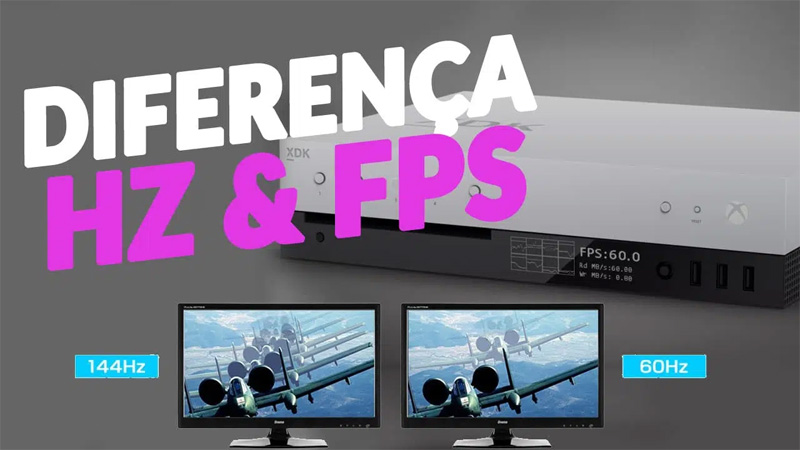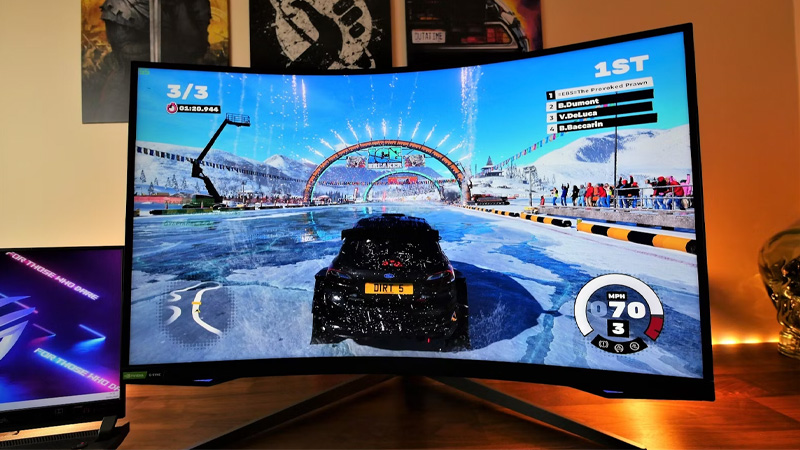Frame Rate (FPS) vs Refresh Rate (Hz) – Definitive Comparison 2024
Imagine taking out your time in a day to enjoy your favorite game – just as you plug into it and started to enjoy it a little you begin to experience constant buffering. And not just the internet buffering but your visuals started to load more, lagging at every second, your PC starting to heat up. What was supposed to be your fun gaming time has turned into a frustration.
If you can relate to this, you’re not alone. It’s common for people to experience buffering and lagging when playing a heavy-game file. Ever wondered why? Let us tell you, what affects the speed of in-game visuals and the graphics. Frame and fresh rates are the two important elements that define the speed at which you in-game visuals perform.
If you have not been familiarized with these terminologies before, let us help you today. In this blog you will get all the information you need about frame and refresh rates and how they impact the speed of your game.
Frame rate also known as frame per second, and refresh rate are the two important factors to consider when streaming your games. If these two factors do not work together, you may have to face difficulties with your game experience.
Frame and refresh rates improve your gameplay by increasing visual/graphic quality and the reaction speed of your in-game elements. You will more likely see these features in shooting and high-octane games.
-
Frame Rate Explained
Even though you may think that frame rate has a connection with your monitor display, in reality it is actually quite the opposite.
Frame rate has nothing to do with your display; rather, it is an important component of graphics and central processing that contributes to the definition of your visuals. To further grasp this, consider that your video or graphic game is a series of pictures that are played in motion. That’s why your GPU’s frame rate tells you how many frames it can transmit to the screen. This also further implies that a high GPU frame rate may allow your monitor to display more visual information.
The number of frames that the GPU can process and output in a second is known as frame rate and is measured in frames per second (FPS).
The frame rate also indicates the number of pictures the GPU can record or process in a single second. Thus, the GPU creates a higher-modeled movie or picture than one that collects fewer photos
-
Refresh Rate Explained
Unlike Frame Per Second, refresh rate is an element of your monitor display. After your video game has been processed, the GPU sends it the to your monitor. Once the video is received by your monitor, the refresh rate calculates the information displayed on your monitor at different intervals.
In simple words, the refresh rate calculates how fast your monitor displays information on the screen that comes from the GPU. If your monitor’s refresh rate is high, then your video will load less and work smoothly.
Assume you have two screens (Monitor A and Monitor B) connected to a GPU that can produce 144 frames per second. The refresh rates of monitors A and B are 144 Hz and 70 Hz, respectively. The monitor with the 144 Hz refresh rate will be able to show all 144 frames produced by the GPU faster. On the other hand, the monitor with a refresh rate of 70 hz will detect 70 frames, and these frames will be shown more slowly, creating a lag.
In another scenario, your GPU frame rate is 49fps. Next, you connect it to two monitors, A and B. They have a refresh rate of 148 and 60 Hz, respectively. Both monitors can easily collect all the frames but still, the monitor with a higher refresh rate will have a clear and detailed image.
However, the number of frames that are displayed on your monitor will depend on the refresh rate, regardless of how many frames are generated by the graphics card. It is still advised to invest in a monitor that has the same refresh rate. This means you want your monitor’s refresh rate to be at least 60 Hz if your GPU can achieve a frame rate of, say, 60FPS.
Both are important elements of gaming and go hand in hand. However, they are both very different from each other.
-
Units
FPS is the measurement unit for the frame rate of your GPU, whereas hertz is the measurement unit for the refresh rate of your monitor.
The frame rate of an image refers to how clear and detailed an image appears on the screen. On the other hand, refresh rate means how quickly images load or appear on the screen.
-
Upgradeable
If you want to upgrade your frame per second, you will need to invest in a more capable GPU. On the other hand, if you want a higher refresh rate, you will need to invest in a more efficient monitor.
|
Frame Rate |
Refresh Rate | |
| Units of Measurement | Frame Per Second (FPS) | Hertz (Hz) |
| Functionality | Refers to how clear and detailed images are | Refers to how quickly images appear on the screen |
| Upgrade | Invest in a high-spec GPU | Replace the PC with a more efficient one |
Refresh rate and FPS both offer identical advantages. If you Suppose planning to upgrade any one of them and reap the benefits, that will not work. They both are equally important and perform hand in hand. Therefore, if you decide to upgrade your gaming PC, you will have to consider both elements.
While frames per second and refresh rate are two different concepts, they are related in terms of the visual enhancements they provide. The poorer performance of both will cap any rise in performance in one.
For example, you won’t see the advantage of a 144Hz display if your graphics card can only produce 60 frames per second. That means your monitor allows just 60 frames per second even though your GPU can produce a steady 120 frames per second.
In the worst-case scenario, the difference between frame rate and refresh rate can cause screen tearing, in which the displayed image seems misaligned horizontally. Even the likelihood of this happening is slim, thanks to the latest technology. This is why the FPS and refresh rate of your games should be as closely aligned as possible to obtain optimum performance.
-
Which is better?
As mentioned earlier, both work hand in hand. It doesn’t matter which one you choose; just make sure the two match. This is because a monitor with a high refresh rate will only display the available frames, and a GPU with a lower FPS will only create the frames that it can produce. Likewise, a low refresh rate monitor and a high frame rate will only show the frames it can capture and will ignore the ones it cannot.
If both are not balanced, the performance of the higher one will be capped.
-
Key tips:
● Specifically, first-person shooter games employ frame rate (FPS) as a performance indicator. This is because you can view objects in more detail and capture more precise pictures with a system that has a higher frame rate. Additionally, a greater frame rate will show you any game changes realistically. The suggested frame rate for gaming PCs is sixty, and for consoles, it is thirty.
● Let’s say your frame and refresh rate are balanced. What can go wrong? Syncing! If they are not synced together, it can cause tearing. This is why whenever you upgrade your PC or GPU, make sure they are synced together for a better gaming experience overall.
● If you own an LCD or monitor, both of them are the same when it comes to refresh rate. Thus, an LCD with a greater refresh rate will perform smoothly and efficiently.
ES-960-Series Outdoor Displays are LEDSINOs premium energy-saving LEDs that come with a dual voltage power supply, which distributes the current accurately. This procedure allows you to reduce a significant amount of power usage. The specialized technology of this LED prevents heating.
These LEDs also enable smooth integration and support various configurations. Including curved and right angles, it’s ideal for 3D LED displays and produces fascinating 3D visual displays. Maximizing creative marketing possibilities and audience engagement.
![]() 3D Billboards Best Combination
3D Billboards Best Combination
![]() Energy Saving Display 30% Design
Energy Saving Display 30% Design
![]() Ultralight Aluminum Profile Cabinet
Ultralight Aluminum Profile Cabinet
![]() Standard Size: 480×320/960*960mm
Standard Size: 480×320/960*960mm
![]() With 3 Years Warranty and 5% Spare Parts
With 3 Years Warranty and 5% Spare Parts
![]() Front Convenient Maintenance
Front Convenient Maintenance
![]() Hard Connection, No Need Cables
Hard Connection, No Need Cables
![]() Can Removable Back Power Supply Box
Can Removable Back Power Supply Box
![]() With 3 Years Warranty and 5% Spare Parts
With 3 Years Warranty and 5% Spare Parts
5. Bottom Line
To have a smooth and realistic gaming experience, we need a balanced system. This means the frame rate and refresh rate need to be accurate. Even though both are different, they work together. A quick run through the pointers:
● A refresh rate is for the monitor, whereas a frame rate is for the graphical processing unit.
● If you want to increase the frame rate, you will need an upgraded graphics card or GPU. Similarly, if you want to increase the refresh rate, replacing your old monitor with a newer one is the way to go.
● Make sure everything is synced together to prevent tearing.
Contact
 Building D, Hongfa Science Park,
Building D, Hongfa Science Park,
2035 Songbai Road, Shiyan, Bao’an District, Shenzhen, Guangdong, China.









